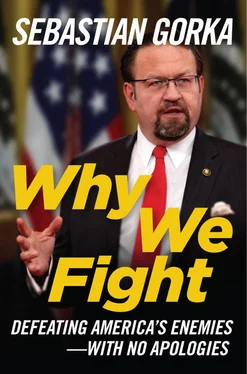Sebastian Gorka - Why We Fight - Why We Fight - Defeating America's Enemies - With No Apologies
Здесь есть возможность читать онлайн «Sebastian Gorka - Why We Fight - Why We Fight - Defeating America's Enemies - With No Apologies» весь текст электронной книги совершенно бесплатно (целиком полную версию без сокращений). В некоторых случаях можно слушать аудио, скачать через торрент в формате fb2 и присутствует краткое содержание. Город: Washington, Год выпуска: 2018, ISBN: 2018, Издательство: Regnery Publishing, Жанр: Политика, Публицистика, на английском языке. Описание произведения, (предисловие) а так же отзывы посетителей доступны на портале библиотеки ЛибКат.
- Название:Why We Fight: Why We Fight: Defeating America's Enemies - With No Apologies
- Автор:
- Издательство:Regnery Publishing
- Жанр:
- Год:2018
- Город:Washington
- ISBN:978-1-62157-640-2
- Рейтинг книги:5 / 5. Голосов: 1
-
Избранное:Добавить в избранное
- Отзывы:
-
Ваша оценка:
- 100
- 1
- 2
- 3
- 4
- 5
Why We Fight: Why We Fight: Defeating America's Enemies - With No Apologies: краткое содержание, описание и аннотация
Предлагаем к чтению аннотацию, описание, краткое содержание или предисловие (зависит от того, что написал сам автор книги «Why We Fight: Why We Fight: Defeating America's Enemies - With No Apologies»). Если вы не нашли необходимую информацию о книге — напишите в комментариях, мы постараемся отыскать её.
Why We Fight: Why We Fight: Defeating America's Enemies - With No Apologies — читать онлайн бесплатно полную книгу (весь текст) целиком
Ниже представлен текст книги, разбитый по страницам. Система сохранения места последней прочитанной страницы, позволяет с удобством читать онлайн бесплатно книгу «Why We Fight: Why We Fight: Defeating America's Enemies - With No Apologies», без необходимости каждый раз заново искать на чём Вы остановились. Поставьте закладку, и сможете в любой момент перейти на страницу, на которой закончили чтение.
Интервал:
Закладка:
But who we are and, therefore, where we need to seem to be difficult questions to answer, especially for those in Washington who are meant to know. Yet we must understand our own context beyond the most topical “crisis of the day” and at a level of analysis deeper than that supplied by the mass media or sundry talking heads.
This exercise in national self-understanding necessarily concerns the “strategic culture” of the United States. After all, strategic culture influences how we approach threats, and it challenges and shapes our responses. But after the events of the past seventy years, it is just as important to understand the evolution of US strategic culture, which has been far from static since 9/11.
World War II and the Cold War left our country emphasizing firepower, technology, and nuclear deterrence—a posture that was distinctly unsuited to the very different strategic reality that emerged in the 1990s. Now, we must honestly assess how the intelligence-gathering and forecasting habits of World War II and the Cold War have impeded our warfighters in the missions they are expected to execute today. We have invented new capabilities, such as offensive unmanned aircraft systems and stealth technology, and we have written new doctrine for current missions, but we have not yet fundamentally reworked the architecture and culture of a national security establishment designed primarily to defeat the armies of other countries.
In addition to delving into the premises of our strategic culture, we must examine the context in which the rest of the world finds itself at the beginning of the third millennium. Without wandering into the black art of long-range projection, we must ask the right questions about relative power, the role of ideology, and the influence of demographics on actors who in the past were not of concern to us or, in that age of bipolar conventional military standoff, simply did not exist. Nation-state actors and non-nation state actors alike are affected by geopolitical changes. Power can no longer be measured simply in terms of gross domestic product or numbers of tank regiments.
Lastly, and perhaps most difficult of all, it is the duty of all senior officials involved in providing for national security to seriously and candidly reassess the assumptions upon which our existing systems of analysis and planning are based. We must evaluate how apt these central concepts still are and formulate new principles should they be found wanting. And this is a task not only for the elite. If we are to be responsible citizens and voters, we too much understand how the world has changed since the Cold War.
We must recognize that no concepts beyond the core values enshrined in the Declaration of Independence and the Constitution are immune to critique and reappraisal when it comes to securing the homeland. America’s founding values are sacrosanct and immutable, yet we must be ever imaginative and flexible in how we realize and protect them. For example, if the “wondrous trinity” of Clausewitz is not relevant for an age of globally dispersed non-state actors like al-Qaeda or ISIS and cyberwarriors such as the worldwide hacker group, Anonymous—the likes of which the Prussian theorist could never have imagined—it must be discarded or at least substantially reworked.
A survey of our current context should also include century-long trends. The blogosphere, professional military education journals, and civilian publications provide ample reading on how irregular warfare differs from conventional warfare. Nevertheless, we must move beyond the theoretical navel-gazing of purely semantic debates. When Clausewitz delivered his immortal dictum that war is “the continuation of politics by other means,” he was writing in a specific historical and socioeconomic context. No matter how useful his analysis may seem, it cannot be divorced from the age in which it was born—an age when conventional war dominated strategic thought.
Clausewitz’s On War must be understood as one man’s forceful attempt to impose meaning on the clash of national arms. More specifically, it must be appreciated as the intellectual pilgrimage of an officer seeking to explain the destruction of his professional military culture by an upstart foe using the radical approach of levée en masse . That is exactly why Clausewitz sees rational governmental ends behind the actions of his skillful commander, who harnesses the passion and hatred of his troops (the population).
Since the Westphalian concept of the nation-state informs everything Clausewitz wishes to achieve, we are justified in reassessing his model for an age in which violence is mostly the work of non-state actors. And by this, I mean to go even further than the brutal critique by John Keegan I summarized above. It is not simply a question of jettisoning old ways, for there is still a great deal we can learn from the old Prussian for dealing with the likes of Russia or China or North Korea. We need to retain what works and improve upon or add to it for today’s threats, at all times understanding the contextual limitations of all theorists and authors, no matter how famous.
Indeed, context applies to the other great strategist, Sun Tzu, who was also a child of his age. Why else the emphasis on victory without combat as the preferred goal? Unless we see Sun Tzu as a product of the Warring States period, before China was united, we cannot understand that his motivation was not to destroy the enemy, but to coopt the political entities that would become the building blocks of a new empire.
If the context in which Sun Tzu wrote was the drive for unity in China, the context for Clausewitz was the Napoleonic revolution in warfare and a young Westphalian system. On War is crucial to understanding the Westphalian period and the national security architecture to which it gave rise, but it has less to teach us about the post-9/11 age. As Martin van Creveld, one of the few modern strategists worthy of the title, has said, “What [Clausewitz] never imagined was a world in which many, perhaps even most, belligerents consist of non-sovereign, non-territorial organizations.”
We must therefore ask some obvious but new questions to ascertain whether the old models apply. How Clausewitzian is the understanding of the purpose of war for those who wage irregular warfare against us? For example, is ISIS, or even Iran, driven by the same functional approach to the use of violence as we are? On War may remain the key text for nation-versus-nation conflict, with actors operating on logical cost-benefit lines directly connected to obvious political gains. But is the same calculation behind the violence of a religiously-motivated foreign-fighter brigade in Iraq, a Taliban militia in Afghanistan, or a jihadist mowing down innocent Americans in an Orlando night club?
Clausewitz was right about the immutable nature of war, but his Westphalian context shaped his understanding of the role of raison d’état and the trinity of forces that the state both embodies and leverages. Those forces still exist, but the new actors we face—whether they be the Taliban in Afghanistan or surviving al-Qaeda units in Yemen—make very different calculations, in which rational, policy-oriented cost-benefit analysis and justifications are trumped or qualified by less dispassionate and more otherworldly influences.
The triangle of government, people, and army (or commander), representing, respectively, reason or policy, passion, and skill, is less than useful for many of the irregular threat groups we are fighting today because they are not nation-states. Take, for example, al-Qaeda, still quite active despite the media’s failure to pay attention. Since the loss of its Afghan base of operations, no government or nation is associated primarily with this foe. The violence of al-Qaeda has no policy goals like those of a “normal” government. Its ends are determined by the religiously fueled visions of ideologues, some alive today, but many, such as Sayyd Qutb and Abdullah Azzam, deceased. None of these ideologues or irregular elites politically represented a nation in the Westphalian sense. The Clauswitzian trinity is simply not relevant.
Читать дальшеИнтервал:
Закладка:
Похожие книги на «Why We Fight: Why We Fight: Defeating America's Enemies - With No Apologies»
Представляем Вашему вниманию похожие книги на «Why We Fight: Why We Fight: Defeating America's Enemies - With No Apologies» списком для выбора. Мы отобрали схожую по названию и смыслу литературу в надежде предоставить читателям больше вариантов отыскать новые, интересные, ещё непрочитанные произведения.
Обсуждение, отзывы о книге «Why We Fight: Why We Fight: Defeating America's Enemies - With No Apologies» и просто собственные мнения читателей. Оставьте ваши комментарии, напишите, что Вы думаете о произведении, его смысле или главных героях. Укажите что конкретно понравилось, а что нет, и почему Вы так считаете.












